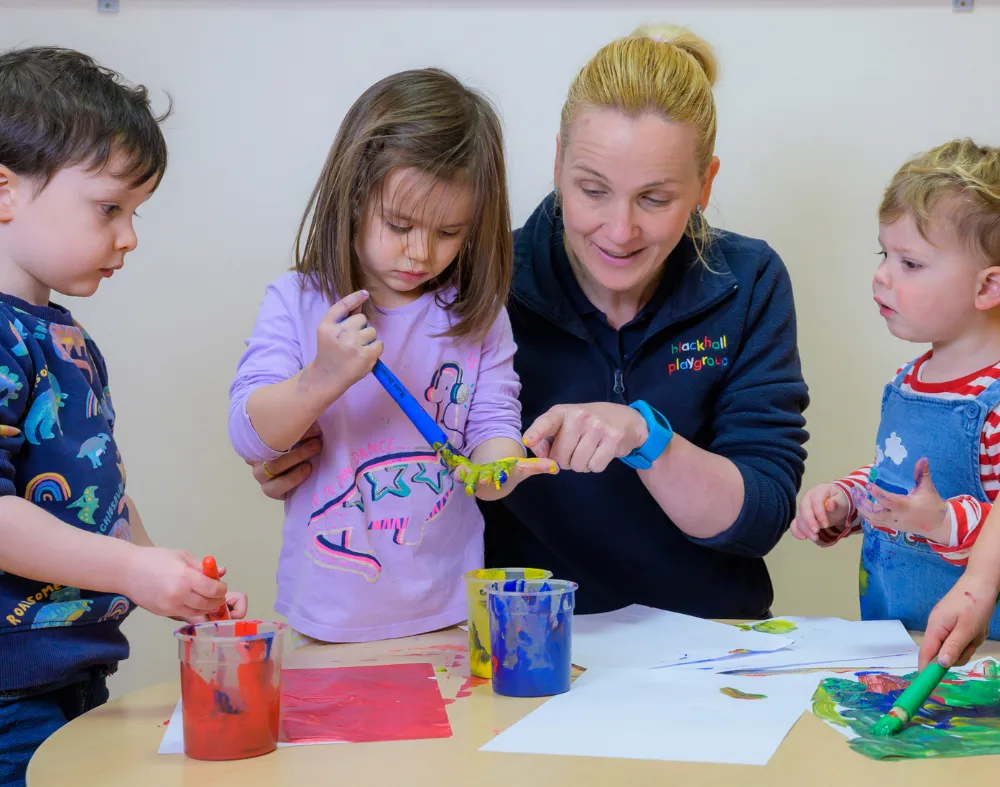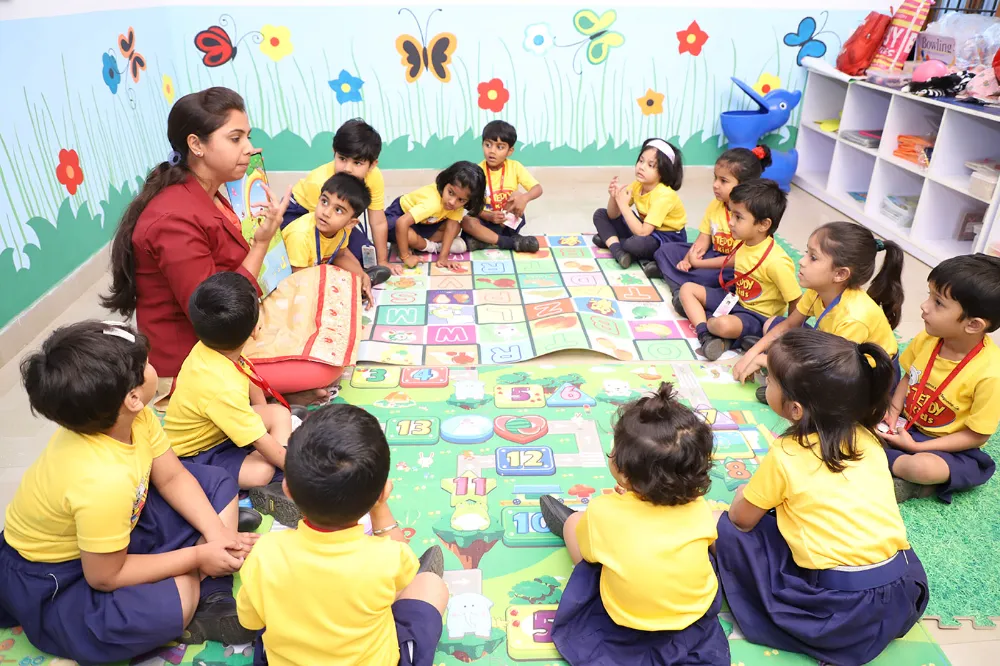Course for Nursery Class

Source: assets
Course for Nursery Class
Emerging as a beacon for early childhood education, Vidhyanidhi Education Society’s “Course for Nursery Class” is setting the standard for shaping young, eager minds. Far more than a basic preschool program, this comprehensive course aims to transform even the most inexperienced individuals into competent and caring nursery teachers.
Vidhyanidhi Education Society’s Course for Nursery Class combines an in-depth understanding of child psychology, developmental milestones, and innovative pedagogical approaches to foster a holistic environment for young learners.
As we journey together through this course, we’ll unveil how it can help mold the future generation, one tiny step at a time.
Table of Content
- What Is NTT Course?
- NPTT Career
- Online NTT Course
- Eligibility NTT Course
- NTT Training Course Duration
- Nursery Courses in Mumbai
- NPTT Course Fees
- How Much Money Does a Nursery Teacher Make?
- NTT Course through Distance Learning
- NTT Course Subjects
- What Are the Oral Subjects of NTT?
- What Is the Qualification of a Preschool Teacher?
- How Can We Teach Nursery Class?

Source: klayschoolslive
What Is NTT Course?
An NTT Course is a twelve-month course. Its central goal is to provide specialized training for teachers intending to work at the pre-primary educational stage in India.
The course is designed to enhance the overall educational quality at this critical stage and to uplift the standard of teaching. NTT students are nurtured in fields such as child pedagogy, instructional techniques, foundational subjects, and communication skills.
NPTT Career
The successful accomplishment of the NTT Course for Nursery Class at Vidhyanidhi Education Society (VES) lays a solid foundation for an immediate foray into the teaching profession. From private and government schools to preschools, kindergartens, and Montessori establishments, numerous job prospects are at your fingertips.
Opportunities also exist in daycare centers, crèches, schools run by NGOs, early childhood centers, and preparatory schools. Moreover, you can pave your way to entrepreneurship by starting your educational venture.
The potential NPTT Career avenues include:
- Teacher or Assistant Teacher
- School Center Head
- Supervisor
- Principal
- Preschool Center Director
- NGO for Preschoolers
- School Administrator
- Home Tutor
- Shadow Teacher
- Education Entrepreneur: Operates a Playschool
Online NTT Course
Enrolling in the Online NTT Course at VES offers an array of benefits:
- Highly respected certification in Nursery Teacher Training
- Open-ended enrolment all year round
- The course can be pursued from any place in the world
- A decent internet connection is the only thing needed
- Each module comes with pre-recorded content
- An experienced course coordinator for full-course guidance
- No mention of an ‘online course’ on your certificate
- Delivery of all required materials, assignments, and certificates right to your doorstep.

Source: images
Eligibility NTT Course
To register for the Diploma Course for Nursery Class, it’s necessary to have completed your higher secondary education as an Eligibility NTT Course. For those who aspire to take up a Postgraduate Diploma Course for Nursery Class, a bachelor’s degree in any stream is mandatory.
NTT Training Course Duration
The Diploma and PG Diploma NTT Training Course Duration at Vidhyanidhi Education Society (VES) is one and two years. However, VES offers you the chance to take advantage of the FAST TRACK mode, allowing you to earn your diploma Course for Nursery Class in a year.
Nursery Courses in Mumbai
If a career in Pre Primary Education is your calling, Vidhyanidhi Education Society (VES) provides comprehensive training, equipping you with the necessary confidence to achieve your career aspirations.
The flexible Course for Nursery Class s in Mumbai at VES is offered through regular, online, and correspondence means. Inability to attend regular classes is no barrier, thanks to our online and correspondence learning options.
Prominent features of our Regular Mode Nursery Courses in Mumbai are:
- Comfort-enhancing classrooms
- Dedicated attention to each student
- Extensive workshops covering numerous concepts
- Budget-friendly fees
- Issuing of Internship letters
- Hands-on learning
- Workshops focusing on Art Craft and Teaching aids
Call or Whatsapp at +919869546913 / +9198698 66277 for more details.
For Downloading the brochure click here

Source: ahaslides
NPTT Course Fees
At Vidhyanidhi Education Society (VES), the NTT program’s primary objective is to cultivate skillful teachers and upgrade the quality of education. This vocation-oriented course has been the stepping stone to success for many of our trainees.
A defining attribute of the Course for Nursery Class at VES is its pocket-friendly fee scheme for both online and offline Nursery Teacher Training Courses. With the availability of installment payment options, the course is accessible to all without any financial constraints. VES also offers an array of online payment channels, such as Cash, Cheque, GPay, Paytm, etc.
How Much Money Does a Nursery Teacher Make?
Pay scales for nursery teachers can fluctuate widely, contingent on aspects such as the school they’re affiliated with, the type of educational board, their professional longevity in preschool teaching, their level of education, their rank, and the school’s regulations. Venturing into owning a preschool can prove financially beneficial after completion of the Nursery Teacher Training Course from VES.
In an urban metropolitan area, a Nursery Teacher Make between Rs. 15,000 and 28,000. However, for those located in rural settings, the pay typically lies between Rs. 12,000 and 18,000.
NTT Course through Distance Learning
The aspirations of eager learners are often obstructed by physical distance or occupational commitments. On the other hand, Vidhyanidhi Education Society (VES) is committed to providing top-tier training that addresses the unique needs of its trainees.
To this end, they offer an NTT Course through Distance Learning that significantly aids students from remote regions. Their Course for Nursery Class is also accessible via this route.
Vidhyanidhi Education Society bestows an array of benefits that transcend its course offerings:
- Certification from VES enjoys worldwide acceptance
- Respectable salary packages owing to VES’s international credibility
- Continuous assistance from a dedicated course coordinator for a hassle-free completion of correspondence courses
- Admissions are open throughout the year Performance-based evaluations of trainees using assignments
- Practical training provision, complete with an internship letter
- Significant savings in time and resources by opting for the correspondence course
- Affordable course fees and numerous payment methods are available

Source: readingrockets
NTT Course Subjects
In today’s rapidly evolving educational landscape, the role of nursery teachers is more vital than ever. They lay the foundation for a child’s holistic development and play a significant role in nurturing their cognitive, emotional, and social skills.
Vidhyanidhi Education Society (VES), a renowned institution dedicated to teacher training, offers a comprehensive Nursery Teacher Training Course that equips aspiring educators with the knowledge and skills necessary to create a nurturing and stimulating learning environment for young minds.
Let us delve into the enriching NTT Course Subjects that sets this program apart and empower trainees to excel in the field of early childhood education:
Understanding Child Development
In this module, trainees gain a profound understanding of child psychology and development. They explore the various stages of physical, cognitive, emotional, and social growth in children aged 0-6 years. Through theoretical frameworks and practical observations, trainees learn to identify and address the unique needs and challenges faced by young learners.
Principles and Practices of Early Childhood Education
This segment focuses on the principles and practices that form the foundation of effective early childhood education. Trainees explore different teaching methodologies, curriculum planning, and age-appropriate instructional strategies. They also delve into the importance of play-based learning, creating engaging learning environments, and fostering a positive classroom atmosphere.
Child Health and Nutrition
Promoting the health and well-being of young children is paramount in early childhood education. This module equips trainees with knowledge about child health, hygiene, safety measures, and nutrition. They learn to recognize common childhood illnesses, understand their prevention and management, and implement healthy eating habits to ensure optimal growth and development.
Art and Craft Activities
Creativity plays a pivotal role in the holistic development of young children. This module focuses on introducing trainees to a myriad of art and craft activities that enhance fine motor skills, imagination, and self-expression. Trainees gain hands-on experience in creating engaging and developmentally appropriate art projects, incorporating various materials and techniques suitable for young learners.
Language Development and Literacy Skills
Developing strong language and literacy skills forms a cornerstone of early childhood education. Trainees learn effective strategies to facilitate language acquisition, phonics instruction, storytelling techniques, and the promotion of early reading and writing skills. They also explore the importance of fostering a print-rich environment and encouraging a love for books and literature.
Classroom Management and Behavior Guidance
Creating a positive and well-managed classroom environment is essential for effective teaching and learning. In this module, trainees learn about behavior management strategies, positive reinforcement techniques, and effective communication skills. They also develop an understanding of child behavior patterns and learn how to address behavioral challenges in a nurturing and inclusive manner.
Assessment and Evaluation
Assessment is crucial to monitor and support a child’s progress. Trainees gain insights into various assessment tools and techniques specifically designed for early childhood education. They learn to create developmentally appropriate assessments, interpret results, and use assessment data to inform instructional practices and individualize learning experiences for young children.
Vidhyanidhi Education Society’s Course for Nursery Class provides a comprehensive and well-rounded curriculum that equips trainees with the necessary knowledge and skills to excel in the field of early childhood education.
By focusing on child development, pedagogical principles, health and nutrition, art and craft, language development, classroom management, and assessment strategies, this program ensures that aspiring nursery teachers are prepared to create a nurturing and enriching environment that fosters the holistic growth of young learners.
With Vidhyanidhi Education Society’s commitment to excellence in teacher training, graduates emerge as competent and compassionate educators ready to make a positive impact in the lives of children

Source: acer
What Are the Oral Subjects of NTT?
The term “NTT” can refer to several different entities, so it would be helpful if you could provide more context or clarification. However, in the educational field, “NTT” often stands for “Nursery Teacher Training” which is a Course for Nursery Class. Nursery Teacher Training refers to a program or course designed to train individuals to become nursery or preschool teachers.
The specific oral subjects covered in an NTT program may vary depending on the institution offering the training and the curriculum they follow.
However, here Are the Oral Subjects of NTT that may be included in an NTT program:
Early Childhood Education
This subject covers theories and principles of early childhood education, child development, and learning strategies appropriate for young children.
Child Psychology
It focuses on understanding the psychological aspects of children, including their behavior, emotions, cognitive development, and social interactions.
Teaching Methodologies
This subject covers various teaching techniques and methodologies specifically designed for nursery or preschool-aged children. It may include topics such as play-based learning, storytelling, music and movement, and art activities.
Curriculum Planning
It involves designing and implementing developmentally appropriate curricula for young children, considering their individual needs and interests.
Classroom Management
This subject deals with strategies for creating a positive and engaging learning environment, managing behavior, and fostering a sense of discipline and routine within the classroom.
Language and Literacy Development
It focuses on promoting language development, vocabulary building, and early literacy skills in young children, including storytelling, rhymes, and reading activities.
Health and Nutrition
This subject emphasizes the importance of maintaining a healthy and safe environment for young children, including aspects such as nutrition, hygiene, and basic first aid.
Parent-Teacher Communication
It covers effective communication strategies with parents or guardians, involving them in their child’s education, and establishing a collaborative relationship.
Observation and Assessment
This subject teaches techniques for observing and assessing children’s learning and development, including using appropriate assessment tools and documenting progress.
It’s important to note that the specific subjects and their depth may vary between different NTT programs and institutions. It’s recommended to refer to the curriculum of the specific program or institution you are interested in for more accurate and detailed information.

Source: teddykidsindia
What Is the Qualification of a Preschool Teacher?
The Qualification of a Preschool Teacher can vary depending on the specific country, state, or educational institution. However, some common qualifications and requirements are generally expected for individuals pursuing a career as a preschool teacher.
Here are some typical qualifications:
Education
Preschool teachers must have at least a high school diploma or equivalent. However, many preschools and childcare centers prefer candidates with higher levels of education.
Early Childhood Education (ECE) Credentials
Many employers look for candidates who have completed some form of early childhood education coursework or obtained relevant credentials. These may include a Child Development Associate (CDA) certificate, an associate’s degree in early childhood education, or a bachelor’s degree in early childhood education or a related field.
Licensing and Certification
Some states or countries may require preschool teachers to be licensed or certified. The specific requirements can vary, but they often involve completing certain educational courses, passing an examination, and fulfilling any additional state or local regulations.
First Aid and CPR Certification
Preschool teachers are often required to hold current certifications in first aid and cardiopulmonary resuscitation (CPR) to ensure the safety and well-being of the children under their care.
Experience
While not always mandatory, having prior experience working with young children can be highly beneficial. This experience can be gained through volunteer work, internships, or previous employment in childcare centers, preschools, or similar settings.
Specialized Skills
Preschool teachers should possess certain skills and qualities such as patience, creativity, strong communication and interpersonal skills, the ability to manage a classroom, and a genuine passion for working with young children.
It’s important to note that the specific qualifications and requirements may vary depending on the country, state, and the specific educational institution or employer. It is advisable to check with local regulations and potential employers for the most accurate and up-to-date information regarding qualifications for preschool teachers in your area.
How Can We Teach Nursery Class?
To Teach Nursery Class students requires a combination of various techniques and approaches that are suitable for young children.
Here are some strategies and tips to consider when We Teach Nursery Class:
Create an encouraging and stimulating environment
Set up a colorful and engaging classroom with age-appropriate furniture, educational toys, and visual aids. Use posters, charts, and displays to make the classroom visually appealing and create a positive learning atmosphere.
Use play-based learning
Young children learn best through play. Incorporate hands-on activities, games, songs, and creative play into your lessons. Play helps children develop mental, social, emotional, and physical skills.
Focus on sensory experiences
Nurseries are a great time to introduce children to different sensory experiences. Provide opportunities for them to explore various textures, sounds, tastes, smells, and visuals. Use sensory materials like sand, water, playdough, and sensory bins to engage their senses.
Incorporate storytelling and books
Reading aloud and storytelling are essential for nurturing a love for books and language development. Use age-appropriate storybooks, picture books, and interactive storytelling techniques to capture children’s attention and foster their imagination.
Group activities and playtime allow children to develop their social skills, such as sharing, taking turns, and cooperating. Incorporate collaborative projects, team games, and group discussions to promote interaction and teamwork.
Keep instructions simple and clear
Use age-appropriate language suitable for their developmental level. Break down instructions into small, manageable steps, and use visual cues or gestures to support understanding.
Engage parents and caregivers
Establish open communication with parents and involve them in their child’s learning journey. Share progress reports, organize parent-teacher meetings, and provide suggestions for activities parents can do at home to reinforce learning.
Foster independence
Encourage children to develop self-help skills, such as dressing themselves, tidying up, and organizing their belongings. Provide opportunities for them to make choices and solve simple problems independently.
Be patient and flexible
Remember that young children have varying attention spans and learning styles. Be patient, flexible, and adapt your teaching strategies to accommodate individual needs and interests.
Assess informally
Use observation, anecdotal records, and informal assessments to gauge children’s progress. Assess their learning through play, conversations, and hands-on activities rather than formal tests.
Remember that each child is unique and grows at their own pace. The goal of teaching nursery class is to provide a nurturing and stimulating environment that supports their overall development while fostering a love for learning.
“VES’s Course for Nursery Class: A key to an enriching career!”
To apply online call or Whatsapp us @ +919869866277 / +919869546913 for details
For Downloading the brochure click here
FAQ
What is the fees of NTT course in India?
The fees for the NTT (Nursery Teachers Training) course in India generally range from ₹15,000 to ₹30,000 depending on the institution.
What qualification do you need to be a nursery teacher?
To be a nursery teacher, you need to have a 10+2 education and be a minimum of 18 years of age. These are basic requirements for most NTT courses.
How to get affiliation for nursery teacher training?
You can get affiliation for nursery teacher training by enrolling in VES's NTT course. VES provides globally accepted courses that are ensure quality training.
What is the fees of NTT course in India?
The fees for the NTT (Nursery Teachers Training) course in India generally range from ₹15,000 to ₹30,000 depending on the institution.
What qualification do you need to be a nursery teacher?
To be a nursery teacher, you need to have a 10+2 education and be a minimum of 18 years of age. These are basic requirements for most NTT courses.
How to get affiliation for nursery teacher training?
You can get affiliation for nursery teacher training by enrolling in VES's NTT course. VES provides globally accepted courses that are ensure quality training.




